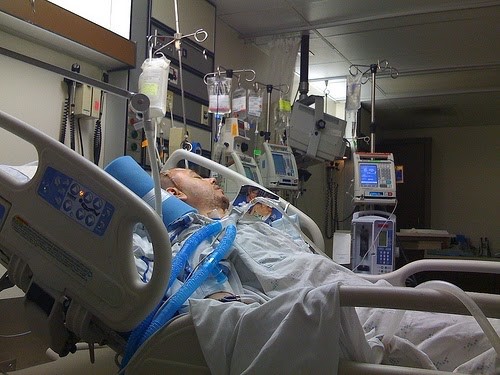Hi, it’s Patrik Hutzel from INTENSIVECAREHOTLINE.COM where we instantly improve the lives for Families of critically ill Patients in Intensive Care, so that you can make informed decisions, have PEACE OF MIND, real power, real control and so that you can influence decision making fast, even if you’re not a doctor or a nurse in Intensive Care!
This is another episode of “YOUR QUESTIONS ANSWERED“ and in last week’s episode I answered another question from our readers and the question was
You can check out last week’s question by clicking on the link here.
In this episode of “YOUR QUESTIONS ANSWERED” I want to answer a question from one of my clients Megan, as part of my 1:1 consulting and advocacy service Megan’s brother has a tracheostomy in ICU and Megan is asking how can her brother get out of ICU alive whilst ICU doctor says he will have no quality of life.
How Can My Brother Get Out of ICU Alive Whilst ICU Doctor Says He Will Have No Quality of Life?

“You can also check out previous 1:1 consulting and advocacy sessions with me and Megan here.”
Patrik: You have a much better feel by now what you’re dealing with. And it’s good that you know that there are potentially other patients who are in a similar situation because yeah, it’s definitely playing on their mind in terms of, how are we going with our ICU if there’s potentially three, four patients going to stay here for much longer? It’ll impact the whole hospital. Through the whole hospital.
Megan: I understand, it goes right the way back to people who are having heart surgery perhaps or-
Patrik: Yeah, very much so.
Megan: … complicated, yeah. They would go straight in there, wouldn’t they?
RECOMMENDED:
Patrik: Very much so, or in ER, doesn’t matter. Or patients having medical emergencies in the hospital ward.
Megan: Yes.
Patrik: Right? So it’s impacting on every level. I can tell you that they will be having bed management meetings every morning for the hospital and somebody will be saying, “What’s happening in ICU? Why are you still having two long-term patients in there? What’s happening? Where are we going? Blah, blah, blah.”
Megan: Yeah. Impacting everywhere.
Patrik: That’s right. You don’t have to rub this in their face, but you have to have that knowledge potentially when the time is right.
Megan: Up your sleeve.
Patrik: Yes, yes, absolutely. Absolutely. But for now, I think your sort of points where you can hone in is definitely the DNR, about the policy. And then also, your observations in regards to Ryan improving and then basically they’re making a U-turn sitting down with you in front of him. How inappropriate is that? And talk in front of him that he’s not going to make it, that is just, it’s just inappropriate.
RECOMMENDED:
Megan: Yes. I think they’ve been quite inappropriate on a couple of occasions really. With the things, they’ve said. Even when my parents died, there was never this type of thing going on. This is quite, this is outside my experience of ITU, because both my parents died in ITU. But they were more elderly obviously. Although my dad wasn’t that old. He was 76, he wasn’t that old.
Patrik: No, no.
Megan: But my mom was 85 with a number of different issues, but there was never this kind of, they were much more gentle as well with me. They’ve been rather brutal with Ryan.
Patrik: Yeah, it sounds like it. And you know, again, probably putting things in perspective, tracheostomy was done on the 22nd of August. So we’re now, today’s the 6th, that’s nine. So 15 days. Again, it’s not long.
Megan: It’s not long.
Patrik: No, it’s not a long, so all of that, for them it’s too long. But that’s besides the point.
Megan: Just to interject there, a lot of the time I asked them, “What’s happening with the breathing?” They say, “He’s breathing on his own. He’s on CPAP.” And this is before I got really into all this understanding about CPAPs. So he’s been doing very, very well on the breathing, but he does have some secretions still.
Patrik: Sure, sure. And they may not go away for a while, but I tell you when patients are dying if they are on a tracheostomy and ventilator, right? If they’re not breathing CPAP, CPAP is the ventilation mode that is the ventilation mode that’s before weaning. Right? So he’s breathing on a minimal support.
Megan: Yes, and he doesn’t seem at all stressed either.
Patrik: Right. So if he was in a different ventilation mode, where he can’t be taken off the ventilator, I would want to know, okay, why can’t they take him off the ventilator? What’s happening? Maybe he is really dying. But that’s not the case.
RECOMMENDED:
Megan: No it’s not. It was only the case yesterday, but he was only on it for five hours, because they had got him sitting on the edge of the bed and they had been doing all these exercises with him. So that was why yesterday was not so good. And that’s why they said he was dying.
Patrik: Yeah, and how-
Megan: But he said to me, “You can see he’s tired. What do you think?” I suggest he’s tired. He says, “There you are then. That’s my point.”
Patrik: Absolutely, and how is he going with, do you think he’s confused in there?
Megan: I think he’s very, very demoralized, or depressed.
Patrik: Sure, sure, sure.
Megan: But confused, no. I say, “Hello Ryan, it’s so and so day. You’re in the intensive care. Do you know?” And he’ll nod and then I’ll say to him, “I’m in your flat. What would you want me to do about the white chair in your bedroom? I think we could do with replacing it.” And he’ll nod.
Patrik: Sure.
Megan: Or he’ll say, “No, no.” I say, “Do you want a new carpet, a fluffy carpet?” He says yes. Okay. So he’s responding. They say he’s not, but it’s nonsense. Of course, he is. And they’ll say, “Your sister’s here.” And he’ll look straight up at me and smile.
Patrik: Right, that’s good. Yeah, because of course he’s demoralized. Of course, he is, there’s no doubt about that. Are they giving him his normal anti..?
Megan: Yes, they are. But they have reduced the lithium because they wanted to reduce the load on his kidneys for a while. They haven’t cut it out, they have just reduced it. That’s the kidney killer, that lithium.
Patrik: Yeah. Okay. So there’s a clear sign that he was tracking well, they’ve had a meeting and now it’s a complete u-turn. And it’s going in the other direction. So the question really is, tomorrow or today when you’re going back in there, how confrontational do you want to be? That’s the question.
Megan: I’ll be as confrontational as it takes, to give my brother the best chance. Because I don’t actually care what these people think of me.
RECOMMENDED:
Patrik: Yeah, and you shouldn’t.
Megan: I shouldn’t, because this is not a popularity contest. That we’re talking life and death and I feel that they probably will. The more confrontational I get, the more they will be. The trouble is, they do get difficult and they close ranks a bit.
Patrik: Yeah. They do, but because you know that’s happening, you can be prepared for that as well, right? It’s not that you don’t see it coming, or it’s not that you can’t argue on a clinical level. Your brother, up until yesterday, was weaning off the ventilator. He was having eight hours a day off the ventilator. There’s no reason why he can’t continue with that if they are giving him the resources. He needs encouragement and positive vibes.
Megan: He does, yes. You see perhaps, what I think they have done with him, is they have left him too long in the bed. And he is just losing the will to live and muscle mass and strength. It seems he’s just been in that bed, for so long.
Patrik: Absolutely. Is there any natural daylight in this ICU?
Megan: No, that’s what I was going to say to you. He’s in about the worst possible bed because there’s no natural light. They reserve the beds, the rooms with natural light, are separate rooms. It’d be lovely for him, but they’ve had people in there, where they’ve been barrier nursing them. There’s been a lot of people in there, with highly contagious, I don’t know, diseases? Or bugs, so there’s only three rooms with natural light. And it’s horrid where he is, it’s a very busy spot. There’s no peace, there’s no privacy.
Patrik: Yeah, there’s no privacy at all.
Megan: No privacy, even the nurses say, come on Ryan, we’re going to wash you. And I can imagine Ryan thinking, oh, please, give me my dignity I don’t want you to, go away.
Patrik: Well, I’ll tell you the other thing there. You’re talking about washing, even though Ryan’s on the ventilator most of the time. There is absolutely no reason and I don’t know about the set up in this ICU. A good ICU would put him on a commode chair, or on a shower trolley. And would shower him at least once a week.
RECOMMENDED:
Megan: No, they’re not doing that.
Patrik: That’s terrible. Because, that to me, is better than any medicine.
Megan: Any medicine, is when you feel that water.
Patrik: Absolutely. So that’s all coming down to them writing him off and look, they may not have the equipment there. I don’t know, but again, a good ICU that’s really striving to look after their patients would do that.
Megan: Yes. There’s nothing like that goes on. Nothing.
Patrik: But I think another strategy is really, to get that specialist input. Get that input from the oncologist, demand that, right? So I’ll tell you why this is important. Yes, they may have spoken to the oncologist, but you want to get that from the horse’s mouth really. Rather than getting it second hand and I’ll tell you what we’ve done, or what we often do in other situations like that.
Patrik: Like again, there was an issue about not waking up and I said, look, get the neurologist in. Because the ICU said, oh, he’s not going to wake up, he has brain damage from the cardiac arrest. It turned out, he didn’t have brain damage. And you need that specialist input to say, okay, the neurologist then said, well, look, he needs time. And he was given that time and it paid off. In Ryan’s situation, yes, the oncologist might say, look, we’re only doing this and this. But again, number one, you got to ask again and you almost want to be there, when that oncologist comes in.
Megan: I did ask once about it and they said to me, oh, just don’t worry about that. That’s just not the issue right now and then they tell me, it is the issue. That he’s dying and it’s because of cancer. And the cancer is making him weak and he’s weak and he’s dying. So it is part of the thing, isn’t it?
Patrik: Sure. It is. Totally. But sometimes the specialists go against each other, sometimes. Not all the time, maybe they have mapped it out, but you only get it secondhand at the moment.
Megan: Yes. Because I did ask and they absolutely dismissed me, as if I was crazy really. It’s just like nothing to do with it. But then yesterday, he absolutely said it was.
Patrik: Yes, exactly. And also with what he said yesterday that Ryan’s not going to make it. Obviously I’m paraphrasing here. Did he lay out a plan, or did he just leave it as a matter of fact?
RECOMMENDED:
Megan: Just left it as a matter of fact. And I said to him, but hold on a minute, so many things are much better. So many things and I reeled off a few things. His breathing and he’s been on the CPAP, he’s opening his bowels and his kidneys are stable. And he said, oh well, yes, I’m pleased about that, but it doesn’t change the fact that he’s very weak. And then the next infection he gets, he won’t be able to deal with it and that will be that.
Patrik: And again, the longer patients are in ICU, the higher the risk for an infection. But again, it doesn’t mean that patients can’t fight it. This is almost like a vicious cycle. What happens is the longer the patients stay in ICU, the higher the risk for an infection, right? Especially since you’ve already spotted, there are a lot of other patients that they’re isolating, because of infections, right? So the risk is much higher in ICU. So the sooner he can get strong and get out of there.
Megan: The better his chances.
Patrik: Absolutely.
Megan: Because Patrik, the pneumonia was hospital acquired, he didn’t have it when he went in. That all started in the ward. He had septicemia, part of me wishes he could have been treated at home, so. He had septicemia and he had problems with his kidneys because he’d been on the floor. That’s what he had, when he went in. And now he’s got pneumonia, a urine infection which has gone, lung infection, which is pneumonia, has gone they say, so. But that was hospital-acquired, he didn’t, as far as I know, go in with it.
Patrik: It’s not surprising. The minute you put somebody on a ventilator, the chances to get pneumonia is huge. So I’ll tell you another strategy, or let me ask you this. When Ryan is off the ventilator, have they used the speaking valve yet?
Megan: No, they said, that somebody hadn’t come to assess him, or something and he was too weak, or something.
Patrik: Well, if they hadn’t made an assessment yet, how can they say he’s too weak?
Megan: I don’t know. You see what they’re like, they brush you off and brush you off.
Patrik: When somebody is weaned off the ventilator, one of the things that should happen, is a speech therapy assessment, right? And once somebody is off the ventilator, they can be tried with a speaking valve. Okay. So yes, he may be too weak for that, but it sounds like they haven’t even tried.
Megan: No, they said they came and saw him and said it was not right, at the moment.
Patrik: How long ago was that?
Megan: Patrik, I’m trying to remember what they said, but it was a few days ago, I think.
Patrik: Okay. If you gave Ryan a piece of paper and a pen, can he write, or is he too weak?
Megan: He’s too weak.
Patrik: He’s too weak. Okay. Because, one thing that I believe needs to happen, is that you need to get out of your brother, what he wants, right? And at the moment, they’re just talking over him. They’re talking over you and yes, you’ve got enough information to go back to them. But what’s critical in a situation like that is, a speaking valve would be great. But even so, you could arrange a series of questions and just let him nod, yes or no. But that would be enough to show them, hang on a sec, before you’re making life decisions, go and talk to Ryan, right.
RECOMMENDED:
Megan: Yes, because he knows what you’re saying. And they always, say, there’s an expression they have, appropriate or something. It’s their expression for saying that somebody knows, what they say Ryan is 100%, that’s what they say. And whenever I ask him anything, we were asking him. The nurses there were interested in the 70s and sixties music and my brother is an absolute aficionado. They are asking him, Ryan, which of the Bee Gees albums, is it Spirits Having Flown? Which would you suggest we go and buy? Spirits Having Flown, or Saturday Night Fever? And they’re saying Saturday Night Fever and he’s going, yes. And then I was saying, How Deep Is Your Love, Ryan, which is it? Which album is that on? Saturday Night Fever? He’s going, yes. I mean he’s not at all, these are questions that he couldn’t possibly if he was…
Patrik: No. Okay. So then, this is good information. Last time, have we spoken about the Glasgow Coma Scale? I don’t think so.
Megan: No.
Patrik: Okay. Very briefly, the Glasgow Coma Scale is an assessment to assess neurological conditions in ICU, right? Ryan would be at the maximum score, for somebody on a ventilator, right? So I’ll give you the very brief version, you and I talking now is the Glasgow Coma Scale 15, that’s the maximum score. For Ryan, who was on a ventilator and can’t talk, the maximum score is 11. But he would achieve that and I will send you, when we come off this call. I will send it to you in an email, so you can have a quick look. Why is this important, number one it’s an assessment tool used in ICU, right? If somebody is scoring the maximum score, right? Why would you not ask them what they want, right? Seriously.
Megan: Very true.
Patrik: Right. So if he’s shaking hit his head, or nodding his head appropriately. What they can ask him about, is whether he wants to get out of ICU alive, or not. It’s a very simple, straightforward question. That he needs to be asked, before any decisions about DNR, or he’s not getting out of ICU alive. Before any of that is even approached.
RECOMMENDED:
Megan: To ask him that question.
Patrik: Absolutely.
Megan: I say to him every day, Ryan, this is what I say, there is a plan, hold on. They’re working towards getting out this tube. Once the tube comes out, then you will be, well I said that with the tube. But I talk about the tracheotomy. And then I say to him, what they want to do is to get you to breathe completely on your own. And then eventually this tracheotomy will come out. But then they will roll the cuff down and you will be able to take sips of water. I tell him this and I say there is a plan. And the plan is to get you out of here, hold on. And he just nods and nods.
RECOMMENDED:
Patrik: Yeah, absolutely. And it sounds to me like up until yesterday, he was taking small but measured steps. And even they were talking small but about measured steps. But now it’s this you turn and it’s just a matter of managing that. And one of the strategies as well is, you should probably ask them to stop talking. We’ve talked about this briefly, but just to reiterate. You should ask them to stop talking negatively, in front of him.
Megan: Yes. Because he hears and he knows.
Patrik: Absolutely.
Megan: Yes, I’m going to say that. I’m going to say, please, you know that he can hear. You know, that he responds. So please, this is very demoralizing for him. I always try to build up his morale. I say, come on Ryan, you can do this. You’re doing so well. You’ve been eight hours off the support. Tomorrow is going to be another great day. You’re going to go to the chair, you’re going to get stronger. I say all these things, but they don’t say anything like that to him, but I do.
Patrik: Of course. And again, given that they haven’t asked him, it all needs to come down to his wishes. And what they might say and I can tell you already what they might say. If they did ask him and he said, yes, of course, I want to get out of ICU alive. Their response might be, well, but Ryan, if you get out of ICU alive, you will have no quality of life, right? My response to that would be, well, what is quality of life? What is it?
Megan: Yes. What is it and who are you, Mr. Doctor, to decide what Ryan thinks is quality?
RECOMMENDED:
Patrik: Correct.
Megan: It’s very subjective.
Patrik: Very subjective. And what makes qualified to say, he wants to get out of ICU alive. The reality is, that most ICU professions, what I’m almost bound to say. All ICU professionals have no idea of what a patient’s life looks like, six months after ICU. Six weeks, even six days after ICU, right? It’s a missing link, it’s a blind spot, right? For all ICU professionals, including myself. I have no idea what a patient’s life looks like after ICU. I have no idea.
How can you become the best advocate for your critically ill loved one, make informed decisions, get peace of mind, control, power and influence quickly, whilst your loved one is critically ill in Intensive Care?
You get to that all important feeling of making informed decisions, get PEACE OF MIND, CONTROL, POWER AND INFLUENCE when you download your FREE “INSTANT IMPACT” report NOW by entering your email below!
In Your FREE “INSTANT IMPACT” report you’ll learn quickly how to make informed decisions, get PEACE OF MIND, real power and real control and how you can influence decision making fast, whilst your loved one is critically ill in Intensive Care! Your FREE “INSTANT IMPACT” Report gives you in-depth insight that you must know whilst your loved one is critically ill or is even dying in Intensive Care!
Sign up and download your FREE “INSTANT IMPACT” REPORT now by entering your email below! In your FREE “INSTANT IMPACT” REPORT you’ll learn how to speak the “secret” Intensive Care language so that the doctors and the nurses know straight away that you are an insider and that you know and understand what’s really happening in Intensive Care! In your FREE report you’ll also discover
- How to ask the doctors and the nurses the right questions
- Discover the many competing interests in Intensive Care and how your critically ill loved one’s treatment may depend on those competing interests
- How to eliminate fear, frustration, stress, struggle and vulnerability even if your loved one is dying
- 5 mind blowing tips & strategies helping you to get on the right path to making informed decisions, get PEACE OF MIND, control, power and influence in your situation
- You’ll get real world examples that you can easily adapt to you and your critically ill loved one’s situation
- How to stop being intimidated by the Intensive Care team and how you will be seen as equals
- You’ll get crucial ‘behind the scenes’ insight so that you know and understand what is really happening in Intensive Care
- How you need to manage doctors and nurses in Intensive Care (it’s not what you think)
Thank you for tuning into this week’s YOUR QUESTIONS ANSWERED episode and I’ll see you again in another update next week!
Make sure you also check out our “blog” section for more tips and strategies or send me an email to [email protected] with your questions!
Also, have a look at our membership site INTENSIVECARESUPPORT.ORG for families of critically ill Patients in Intensive Care here.
Or you can call us! Find phone numbers on our contact tab.
Also check out our Ebook section where you get more Ebooks, Videos and Audio recordings and where you can also get 1:1 counselling/consulting with me via Skype, over the phone or via email by clicking on the products tab!
This is Patrik Hutzel from INTENSIVECAREHOTLINE.COM and I’ll see you again next week with another update!







